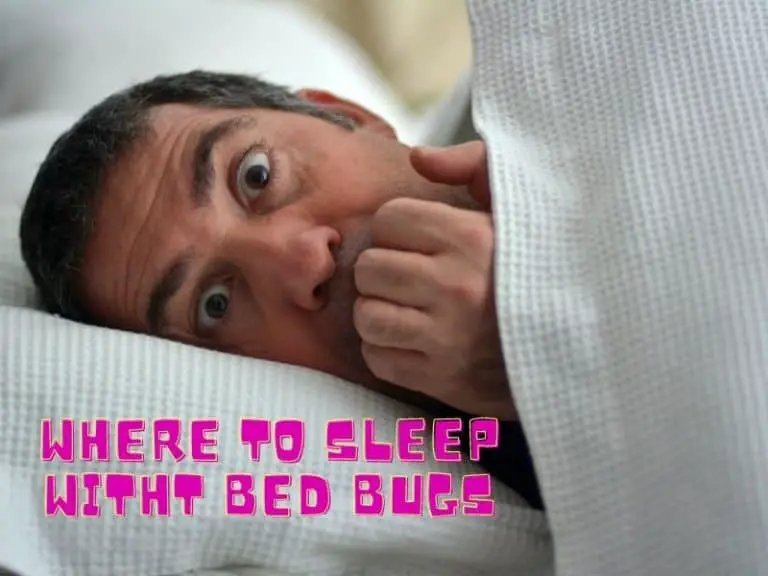5 Reasons Why Bed Bugs Problem Got Worse After Treatment
If you don’t spring into action right away, bed bugs may multiply and spread uncontrollably. However, you may have read on the internet or heard from a friend that the infestation may worsen after trying to put it to an end.
In some cases, the bed bug problem can get worse if the treatment is ineffective or performed improperly. This is true whether the treatment consists of some home remedies or is carried out by professional bed bug exterminators. Certain rules need to be followed to avoid the issue.
Needless to say, it is important for the solution, be it DIY or professional, to be done correctly. Otherwise, you will only end up wasting your time and money.
And, by the way, those bed bugs will keep on feasting on your blood!
Bed bugs may be small, but they can have a outsized impact on your life. This is especially true if you are sharing your bed (and the rest of your home, too) with a massive family of those blood-sucking creatures.
Waking up scratching all over is not the only problem that may come into being if you fail to control those bed bugs.
You may find it hard to sleep at night knowing that some sort of tiny vampires will suck on your blood while you are taking a trip to dreamland. Sleep deprivation is a matter that can cause complications such as:
- Unsightly bags under the eyes
- Irritability
- Poor memory and concentration
- A weakened immune system
- High blood pressure
- Diabetes
- Obesity or unwanted weight gain
If you are driving a car or operating a machine, not getting a good night’s sleep may also endanger your life and that of others around!
Clearly, the importance of dealing with a bed bug infestation at home cannot be stressed enough. Alas, if the treatment of choice is wrong or poorly executed, the problem may persist or worsen.
The following are the top five reasons why bed bug problem could get worse after the treatment.
1. The DIY Bed Bug Treatment Was Done Incorrectly
There are a couple of reasons why it can be enticing to deal with a bed bug infestation via the DIY route:
- You hate that those creepy crawlers are leaving red bumps that itch like there’s no tomorrow. Plus, you want them to suffer and breathe their last breath in your hands. That’s the sweetest revenge!
- You probably heard from a family member or friend that professional bed bug extermination doesn’t come cheap. Well, they are absolutely right, and doing the extermination yourself can help save lots of cash.
While there are many different home remedies for a bed bug infestation, not all of them can provide 100% impressive results. And if you carry out the most effective ones improperly, you may fail to put an end to the problem.
Some people swear by the effectiveness of combining different DIY solutions to finish off the infestation once and for all. For instance, you may spray hiding places with lavender essential oil, whose smell bed bugs cannot tolerate.
Then you may follow it with steam cleaning — bed bugs cannot stand high temperatures.
Unfortunately, if you use lavender essential oil that is not concentrated enough or a steam cleaner that cannot produce steam that’s hot enough, you may not see expected results.
A lot of things could go wrong if you attempt to deal with a bed bug infestation with your own two hands.
But if relying on home remedies seems to be the most practical solution there is, check that you do your assignment first. See to it that you read enough tutorial articles or watch enough DIY videos on how to kill bed bugs without contacting professional exterminators.
Failure to carry out enough research could lead to wastage of your time and money.
What’s more, the infestation may end up worse! In your quest to personally wipe out those tiny bloodsuckers residing in your bed, some survivors may set up camp elsewhere, such as in various furnishings in your bedroom. Some may also wind up in the adjacent bedroom.
If worse comes to worst, you may find yourself in the middle of a messy house-wide bed bug infestation!
The takeaway: Whether you are not completely confident with your DIY extermination capabilities or the infestation is a massive one, it is a better idea to let the pros spring into action instead.
2. There is a Lot of Clutter in The House
Contrary to popular belief, bed bugs can live in many areas in your bedroom other than your bed.
Just about anything that has a crack, seam or corner can provide bed bugs with an excellent hiding place where they can hang out until they long for your blood once more, usually between 2 am and 5 am, which is their peak feeding time.
According to experts, here’s where bed bugs love to chill out, too:
- Electrical outlets
- Switch plates
- Wall cracks
- Loose or peeling wallpaper
- Wall hangings
- Wall and ceiling junction
- Drapes and curtains
- Books and magazines
- Upholsteries
- Floor cracks
- Floorboard seams
- Under the carpet
Refrain from assuming that the list above is thorough. Bed bugs can hide practically anywhere that they can squeeze in when they are full or when there’s light, which they hate.
It’s because of this exactly why a bed bug infestation is worse where there’s a lot of clutter!
This doesn’t mean, however, that a clean home won’t end up with a bed bug infestation.
Here’s a fact: bed bugs can thrive even in the most spotless house on the planet. However, clutter can give bed bugs plenty of hiding places. This can make it easier for them to multiply and make it harder for you to exterminate them.
If your room is messy and you have a bed bug infestation going on (or even when there’s none), it is a good idea to eliminate as much clutter as possible.
You should declutter:
- Before carrying out your choice of home remedies for bed bugs. Doing so allows you to have easy access to potential hiding places, making it trouble-free to douse those creepy crawlers with rubbing alcohol, lavender essential oil, white distilled vinegar, etc.
- After attempting to deal with bed bugs. There is always a possibility that a bed bug infestation may happen again. It is important to rob those pesky bed bugs the opportunity to hide in many places to keep them from multiplying uncontrollably.
If it seems like your bedroom is prone to a bed bug infestation, make sure that you keep it clutter-free always.
3. Sleeping in a Different Room Adds To Bed Bug Issue
No one wants to start the day scratching all over. No one wants to lose sleep over the thought that tiny creatures will come out and suck on their blood while asleep.
Because of this, if you are 100% sure that you are sharing your bed with bed bugs, you may be enticed to spend the night in another bed in another room. It seems to make a lot of sense — if you run away from bed bugs by getting some shut-eye elsewhere in your home, those bed bugs will starve to death.
Well, it is exactly their starvation that can cause the worsening of the infestation sooner or later!
Here are some of the reasons why one of the worst things that you could do if there is an ongoing bed bug infestation is sleeping in another room:
- If they cannot find any host every feeding time, they will move out of their current habitat and go where there’s the blood that they can feast on. Bed bugs do so by moving to one piece of furniture at a time, and by heading to one room at a time. It may take a long time for them to migrate, but they will surely get there.
- They will look for you if they are madly in love with your blood. Are you sharing the bed with someone and it seems like you are the only one who is waking up with bed bug bites? Chances are it is your blood that they like. Some people believe that bed bugs prefer certain blood types over the rest.
The bottom line: Abandoning those bed bugs that cannot live without your blood is a terrible idea!
It is due to this why experts do not recommend you to sleep in another room in your house. They also discourage you from spending the night at your friend’s house or in a hotel.
What you can do instead is to keep on sleeping in the same bed while you think of the best way to deal with the problem.
No matter if you wish to do it with the help of some home remedies for bed bugs or the assistance of professional exterminators, ensure one thing: Do it as quickly as you possibly can.
The quicker that you spring into action, the sooner that you can go back to having a normal life.
4. The Job Was Given to the Wrong Exterminator
Whether the DIY bed bug extermination didn’t work or you don’t want to risk it by dealing with a problem that you have very little to no idea about, it is recommended that you get in touch with bed bug control specialists.
It doesn’t mean, however, that it will guarantee that the infestation will go away.
Different bed bug exterminators have different experience levels. They also have different preferences when it comes to taking out those blood-sucking creatures.
Some bed bug exterminators prefer to employ chemicals to eliminate the problem, while others prefer to use heat to put the issue to an end.
Let us take a quick look at the two most popular ways to deal with a bed bug infestation:
Chemical treatment
Just like what the name suggests, this form of treatment involves the use of chemicals. In many instances, the exterminators will use a handful of different chemicals, each one playing a different role.
Pros: Highly effective if the infestation is at its early stages, provides a long-lasting effect, cheaper than heat treatment.
Cons: Needs plenty of preparation, exposes you and your loved ones to residual chemicals, may need multiple sessions.
Heat treatment
Instead of chemicals, the exterminators will use heat, which bed bugs cannot stand. The temperature of your home will be gradually raised with the help of fans that distribute heat.
Pros: Requires one session only, discreet because your neighbors will only see a generator outside your home, leaves no chemical residues that are bad for the health.
Cons: Way more expensive than chemical treatment, does not provide a long-lasting effect.
Although each form of bed bug treatment comes with its own set of benefits, it means nothing if the task is left in the hands of a company that is not capable of meeting customers’ expectations.
If you make the mistake of contacting the wrong people, not only will the bed bug problem stay, but your possessions and health may also end up in peril if the exterminators are not very good at carrying out the treatment. The importance of hiring the right bed bug control specialists cannot be stressed enough.
Here are some simple tips on finding the right company for the job:
- Get the recommendations of family and friends residing in the area.
- Read online reviews.
- Visit the website of the Better Business Bureau (BBB).
- Don’t be too shy to ask about experience and the cost.
- Go for one that offers a free inspection.
5. Bed Bugs Developed Resistance to Pesticides
Because you are on a tight budget and you cannot wait to get rid of those creepy crawlers, you may find going for chemical treatment as the most suitable step to take.
Worry not because chemical treatment is an effective way to put an end to a bed bug infestation.
However, before we proceed, let us briefly discuss why, as mentioned above, chemical treatment requires multiple visits from the experts, usually two to three times.
The different chemicals that professional bed bug exterminators use can kill bed bugs in different life stages. Well, except for the eggs, which tend to hatch in about ten days.
It takes about five to six weeks for the babies to turn into adults. Before the female ones lay eggs, it is a must for the exterminators to spring into action once more.
Even if the pros show up on schedule to perform a chemical treatment each time, it means nothing if the bed bugs are resistant to the chemicals that they are using.
Did you know that there are nearly a hundred types of bed bugs known to man?
Worry not because only three of those are known to feast on human blood. The type of bed bugs you have at home will depend on where on the planet you live.
However, the type of bed bugs that are bugging you as you sleep may be resistant to some of the chemicals that professional exterminators prefer to administer.
This is exactly why the company that you have sealed the deal with should first investigate which type of bed bugs you have. Unfortunately, not a lot of experts perform this before introducing chemicals into your home.
When going for chemical treatment, make sure that the company is specializing in it.
The takeaway: It’s true that chemical treatment is cheaper than heat treatment. However, you may end up spending more in the end if you put your trust in the wrong professional exterminators.
Having more sessions than the usual two to three times can make the expenses pile up quickly, thus leaving you shelling out more than you would have if you went for a more experienced service provider.
Just Before You Decide Which Bed Bug Treatment You Should Go For
To sum up, you can choose from a handful of ways to deal with a bed bug infestation at home:
- Home remedies
- Chemical treatment
- Heat treatment
While each one of them comes with advantages, there are also disadvantages. It is important to carefully weigh the pros and cons associated with each approach before you make your decision.
No matter the solution you prefer, there is a chance that the problem will come back. After all, even the best bed bug exterminators confess that, in some instances, an infestation may strike all over again.
However, it is a completely different story if it seems like the issue is worse than before.
Experiencing a worsening of bed bug problem after professional treatment means that something went wrong along the way.
However, it is possible for you to notice an increased bed bug activity a few days after the initial chemical treatment. You can put the blame on those bloodsuckers being disturbed by the chemicals used by the pros.
If the treatment is carried out properly and the right chemicals are used, however, you should see fewer and fewer bed bugs after every session.
Photo credit: ©canva.com/AndreyPopov
Especially if you are confident that you hired the right exterminating company, you should trust the process and wait for the treatment’s full effects to take place.
Medical Disclaimer: TheHomePestControl is a digital publisher and does not offer personal health or medical advice. The contents of this website are not intended to substitute for professional medical advice, diagnosis, or treatment.
Affiliate Disclaimer: As an Amazon Associate, I earn from qualifying purchases made on our website. If you make a purchase through links from this website, I may earn a commission at no additional cost to you.







